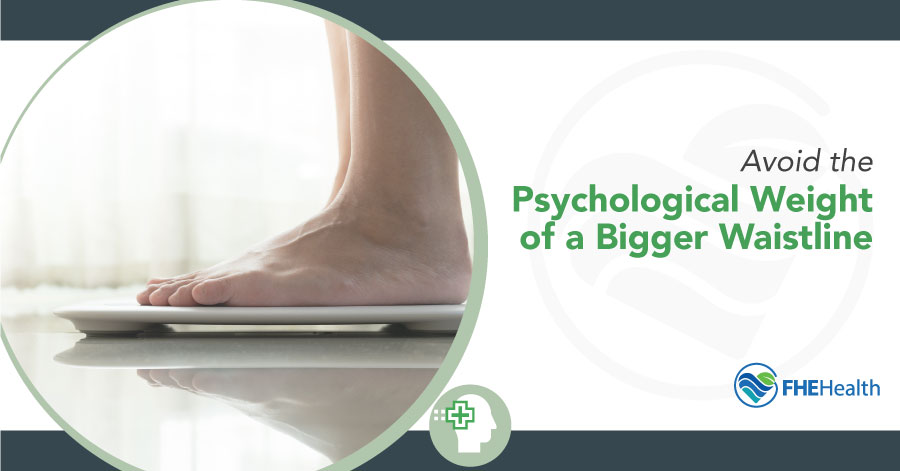
It’s easy to be sensitive about the smallest change in weight or appearance — after all, no one looks at you more than you do. Maybe you wake up in the morning after a night in which you ate a larger meal than usual. You look in the mirror and ask yourself: Was this belly fat always here? Should my chin be more defined? Do I need to go up a jeans size? These seem like simple, practical questions, but for many people, obsessing over weight gains and losses causes harmful body image stress.
There are a variety of social and personal factors that combine to create the sensitivity we have about how we look, but the result is typically the same. Diet and weight gain stress can lead to a number of unhealthy attitudes and behaviors that can severely impact mental health as a whole.
In this piece, we’ll explore how weight gain anxiety and body image stress cause people to take extremely unhealthy actions and create a harmful conception of self-worth.
Treatment can begin quickly and discreetly, get started now As a society, we place a great deal of importance on our appearance as a sign of status value. Something as simple as going to an important meeting with a piece of lettuce in your teeth can have a large effect on the way you’re seen by others, as well as your overall credibility. This is something we internalize over the course of our lives, and as a result, many people feel the best about themselves when they’re satisfied with the way they look. This is, essentially, the concept of self-esteem. This can be rewarding, but it also can cause damage very easily. Life can get in the way of the pursuit of a controlled appearance. As people age, they naturally gain weight more easily and look older, two things that society has judged to run counter to “looking good.” At the heart of why stress about body image and weight gain can compound into severe physical and mental health issues is the high value we put on our physical appearance and, by extension, our weight and body shape. The reason why so much of our self-esteem is tied to weight gains and losses is due to a combination of what we see on TV and what we hear from the people around us. “Getting in shape” is something people are repeatedly told they have to do, both explicitly and subliminally. First, there’s a multibillion-dollar market for weight loss products, fitness programs and gyms that hammers home the message about aggressive weight loss and the pursuit of a “perfect” body. And then, there’s subconscious pressure to lose weight spurred by the people we see on TV and in magazines. Models, actors, athletes and spokespeople are all airbrushed down to the finest detail to send a message that any imperfection — including a little excessive weight — is something that needs to be hidden, and all of this can compound into creating weight gain stress. The way society responds to imagery of overweight people matters also. Too often, conversations about celebrities and public figures devolve into criticisms about their body shape or weight. If an actor gains 10 pounds, for example, it’s assured they’ll be on the front page of a tabloid near the grocery store checkout. As a result, weight gain stress and weight loss anxiety go hand in hand. When we start gaining weight, we stress about it, and then we compound that stress by increasing the pressure to lose weight as quickly as possible. When self-esteem is so closely tied to weight loss and gain, it’s not healthy. Low self-esteem can significantly impact mental health, and when the cause is a person’s weight or diet, the result can be a related mental health condition. Body dysmorphic disorder (also known as “body dysmorphia” or “BDD”) is a condition that causes a person’s self-image to skew from reality. It’s estimated to affect 1% to 2% of the population in the United States. People with BDD obsess over their body image — or at least, their perception of it — and are at increased risk for other conditions, like increased anxiety, depression and a range of eating disorders. The negative feedback loop created by the constant cycle of scrutinizing diet and obsessing over every weight fluctuation can create a very unhealthy relationship with food. A person experiencing this level of body image and weight gain stress can develop an eating disorder based on the unique habits they’ve developed. Some of the most common eating disorders are: These conditions are usually accompanied by bouts of anxiety, depression and suicidal thoughts. Ready to start? More questions about treatment? If you or a loved one is experiencing weight gain stress or obsessing over the food you’re eating, you could be setting yourself up for some severe risks to your mental and physical health. Here are a few tips to reduce body image stress and lower your risk of developing an eating disorder. It’s important to understand that obsessing over healthy habits can be unhealthy in its own right. If you or a loved one are experiencing body image or weight gain stress issues, contact FHE Health and learn about your options to refresh your mindset and start living a healthier, happier life. Treatment can begin quickly and discretely, get started now Meghan Blackford is a Social Media Consultant with over ten years of advertising and digital marketing experience, who helps curate... read moreNeed Help?
The Importance of Body Image and Self-Esteem
Why We Put So Much Value on Our Weight
Commercial Messaging
Social Opinions
The Consequences of the Link Between Weight Gain and Mental Health
Body Dysmorphic Disorder and Eating Disorders
Bulimia, Anorexia and Binge Eating
Begin your recovery today
Tips for Avoiding Body Image Obsession
FHE Health and Excessive Body Image Stress
Start Treatment Now
![]()
About Meghan
Footer






